研究生英语系列教材下unit3-原文+翻译
- 格式:docx
- 大小:29.29 KB
- 文档页数:18
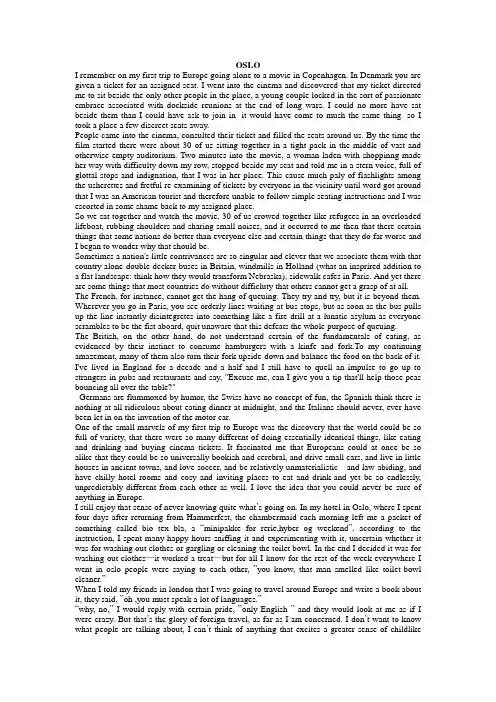
OSLOI remember on my first trip to Europe going alone to a movie in Copenhagen. In Denmark you are given a ticket for an assigned seat. I went into the cinema and discovered that my ticket directed me to sit beside the only other people in the place, a young couple locked in the sort of passionate embrace associated with dockside reunions at the end of long wars. I could no more have sat beside them than I could have ask to join in--it would have come to mush the same thing--so I took a place a few discreet seats away.People came into the cinema, consulted their ticket and filled the seats around us. By the time the film started there were about 30 of us sitting together in a tight pack in the middle of vast and otherwise empty auditorium. Two minutes into the movie, a woman laden with shoppinng made her way with difficulty down my row, stopped beside my seat and told me in a stern voice, full of glottal stops and indignation, that I was in her place. This cause much paly of flashlights among the usherettes and fretful re-examining of tickets by everyone in the vicinity until word got around that I was an American tourist and therefore unable to follow simple seating instructions and I was escorted in some shame back to my assigned place.So we sat together and watch the movie, 30 of us crowed together like refugees in an overloaded lifeboat, rubbing shoulders and sharing small noises, and it occurred to me then that there certain things that some nations do better than everyone else and certain things that they do far worse and I began to wonder why that should be.Sometimes a nation's little contrivances are so singular and clever that we associate them with that country alone-double-decker buses in Britain, windmills in Holland (what an insprired addition to a flat landscape: think how they would transform Nebraska), sidewalk cafes in Paris. And yet there are some things that most countries do without difficluty that others cannot get a grasp of at all. The French, for instance, cannot get the hang of queuing. They try and try, but it is beyond them. Wherever you go in Paris, you see orderly lines waiting at bus stops, but as soon as the bus pulls up the line instantly disintegretes into something like a fire drill at a lunatic asylum as everyone scrambles to be the fist aboard, quit unaware that this defeats the whole purpose of queuing.The British, on the other hand, do not understand certain of the fundamentals of eating, as evidenced by their instinct to consume hamburgers with a kinfe and fork.To my continuing amazement, many of them also turn their fork upside-down and balance the food on the back of it. I've lived in England for a decade and a half and I still have to quell an impulse to go up to strangers in pubs and restaurants and say, "Excuse me, can I give you a tip that'll help those peas bouncing all over the table?"Germans are flummoxed by humor, the Swiss have no concept of fun, the Spanish think there is nothing at all ridiculous about eating dinner at midnight, and the Italians should never, ever have been let in on the invention of the motor car.One of the small marvels of my first trip to Europe was the discovery that the world could be so full of variety, that there were so many different of doing essentially identical things, like eating and drinking and buying cinema tickets. It fascinated me that Europeans could at once be so alike-that they could be so universally bookish and cerebral, and drive small cars, and live in little houses in ancient towns, and love soccer, and be relatively unmaterialistic and law-abiding, and have chilly hotel rooms and cosy and inviting places to eat and drink-and yet be so endlessly, unpredictably different from each other as well. I love the idea that you could never be sure of anything in Europe.I still enjoy that sense of never knowing quite what’s going on. In my hotel in Oslo, where I spent four days after returning from Hammerfest, the chambermaid each morning left me a packet of something called bio tex bla, a “minipakke for rerie,hyber og weekend”, according to the instruction, I spent many happy hours sniffing it and experimenting with it, uncertain whether it was for washing out clothes or gargling or cleaning the toilet bowl. In the end I decided it was for washing out clothes—it worked a treat—but for all I know for the rest of the week everywhere I went in oslo people were saying to each other, ”you know, that man smelled like toilet-bowl cleaner.”When I told my friends in london that I was going to travel around Europe and write a book about it, they said, ”oh ,you must speak a lot of languages.”“why, no,”I would reply with certain pride, ”only English ”and they would look at me as if I were crazy. But that’s the glory of foreign travel, as far as I am concerned. I don’t want to know what people are talking about, I can’t think of anything that excites a greater sense of childlikewonder than to be in country where you are ignorant of almost everything. Suddenly you are five years old again. Y ou can’t read anything, you have only the most rudimentary sense of how things work, you can’t even reliably cross a street without endangering your life. Y our whole existence becomes a series or interesting guesses.I get great pleasure from watching foreign TV and trying to imagine what on earth is going on. On my first evening in Oslo I watched a science program in which two men in a studio stood at a lab table discussing a variety of sleek, rodent-like animals that were crawling over the surface and occasionally up the host’s jacket, “and you have sex with all these creatures, do you?”the host was saying.“certainly,”replied the guest,”you have to be careful with the porcupines, of course, and the lemmings get very neurotic and hurl themselves off cliffs if they feel you don’t love them as you once did, basically these animals make very affectionate companions, and the sex is simply out of this world.”“well, I think that’s wonderful. Next week we’ll be looking at how you can make hallucinogenic drugs with simple household chemicals from your own medicine cabinet, but now it’s time for the screen to go black for a minute and then for the lights to come up suddenly on the host of the day looking as if he was just about to pick his nose. See you next week. ”After Hammerfest, Oslo was simply wonderful. It was still cold and dusted with grayish snow, but it seemed positively tropical after Hammerfest, and I abandoned all thought of buying a furry hat.I went to the museums and for a day-long way out around the Bygdoy peninsula, where the city’s finest houses stand on the wooded hillsides, with fetching views across the icy water of the harbour to the downtown. But mostly I hung around the city center, wandering back and forth between the railway station and the royal palace, peering in the store windows along Karl Johans Gate, the long and handsome main pedestrian street, cheered by the bright lights, mingling with the happy, healthy, relentlessly, youthful Norwegians, very pleased to be alive and out of Hammerfest and in a world of daylight. when I grew cold. I sat in cafés and bars and eavesdropped on conversations that I could not understand or brought out my Thomas Cook European Timetable and studies it with a kind of humble reverence, planning the rest of my trip. Thomas Cook European Timetable is possibly the finest book ever produced. It is impossible to leaf through its 500 pages of densely printed timetables without wanting to dump a double armload of clothes into an old Gladstone and just take off. Every page whispers romance :”M-Z-S-I””B-T-V-V-M””G-L-H-S-V-M-L-P. who could recite these names without experiencing a tug of excitement, without seeing in his mind’s eye a steamy platform full of expectant travelers and piles of luggage standing besides a sleek, quater-mile-long train with a list of exotic locations slotted into every carriage? Who could read the names ”M-W-B-B-G” and not want to climb abroad? Well, Sunny von Biilow for a start. But as for me, I could spend hours just poring over the tables, each one a magical thicket of times, numbers, distances, mysterious little pictograms showing crossed knives and forks, wine glasses, daggers, miner’s pickaxes(whatever could they be for?), ferry boats and buses, and bewilderingly abstruse footnotes.。

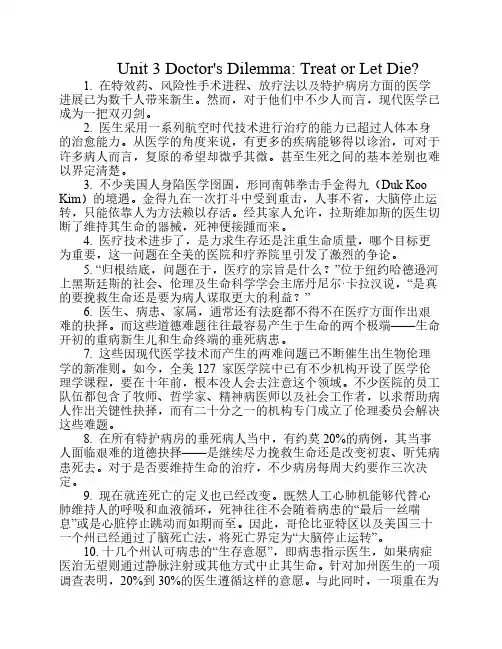
Unit 3 Doctor's Dilemma: Treat or Let Die?1. 在特效药、风险性手术进程、放疗法以及特护病房方面的医学进展已为数千人带来新生。
然而,对于他们中不少人而言,现代医学已成为一把双刃剑。
2. 医生采用一系列航空时代技术进行治疗的能力已超过人体本身的治愈能力。
从医学的角度来说,有更多的疾病能够得以诊治,可对于许多病人而言,复原的希望却微乎其微。
甚至生死之间的基本差别也难以界定清楚。
3. 不少美国人身陷医学囹圄,形同南韩拳击手金得九(Duk Koo Kim)的境遇。
金得九在一次打斗中受到重击,人事不省,大脑停止运转,只能依靠人为方法赖以存活。
经其家人允许,拉斯维加斯的医生切断了维持其生命的器械,死神便接踵而来。
4. 医疗技术进步了,是力求生存还是注重生命质量,哪个目标更为重要,这一问题在全美的医院和疗养院里引发了激烈的争论。
5. “归根结底,问题在于,医疗的宗旨是什么?”位于纽约哈德逊河上黑斯廷斯的社会、伦理及生命科学学会主席丹尼尔·卡拉汉说,“是真的要挽救生命还是要为病人谋取更大的利益?”6. 医生、病患、家属,通常还有法庭都不得不在医疗方面作出艰难的抉择。
而这些道德难题往往最容易产生于生命的两个极端——生命开初的重病新生儿和生命终端的垂死病患。
7. 这些因现代医学技术而产生的两难问题已不断催生出生物伦理学的新准则。
如今,全美 127 家医学院中已有不少机构开设了医学伦理学课程,要在十年前,根本没人会去注意这个领域。
不少医院的员工队伍都包含了牧师、哲学家、精神病医师以及社会工作者,以求帮助病人作出关键性抉择,而有二十分之一的机构专门成立了伦理委员会解决这些难题。
8. 在所有特护病房的垂死病人当中,有约莫 20%的病例,其当事人面临艰难的道德抉择——是继续尽力挽救生命还是改变初衷、听凭病患死去。
对于是否要维持生命的治疗,不少病房每周大约要作三次决定。
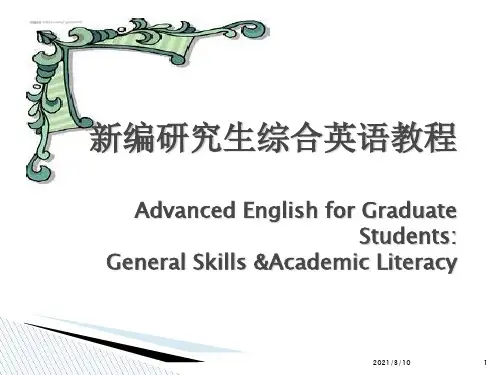


我们没有"享受幸福的权利"C.S.路易斯"毕竟," 克莱尔说,"他们拥有享受幸福的权利" 。
我们当时是在讨论邻里发生的一件事。
甲先生抛弃甲太太,离了婚,准备迎娶乙太太,而乙太太也同样办好了离婚手续准备嫁给甲。
毫无疑问,甲先生和乙太太非常欢喜对方。
如果他们继续相爱,且健康和收入不出什么差池,他们接下来的日子应该会过的很开心。
同样显而易见的是,他们与各自的前任相处不佳。
乙太太最初还是喜欢她的丈夫的。
但是后来他在战争中负伤,丢掉了工作,据说还已经失去了性能力。
此后的生活已经不再是乙夫人当初所期待的。
甲夫人也很凄惨。
她容貌不再,也没有了生机活力。
有人说她因为为他生儿育女,又为护理他度过漫长的疾病期而将自己的精力消耗殆尽,而先前的婚姻生活也因着疾病而黯然失色。
但是不要以为甲是那种将糟糠之妻弃之如敝履的一类人。
我们都知道前妻的自杀让他非常震惊,他曾亲口对我们说,“我又能怎么样呢?每个人都有享受幸福的权利。
我不能错过我的幸福机会。
”之后我就一直琢磨"享受幸福的权利"这句话。
起初这句话给我的感觉怪怪的,听起来就像是在说每个人都有走运的权利。
无论会有哪个派别的道德学家如何评论,我们的幸福或痛苦很大程度上都非人力所能控制。
在我看来,所谓享受幸福的权利并无依据,正如不能要求自己的身高要达到六英尺,应该有个百万富翁的老爸,或者说无论什么时候自己想去野餐了,天气就必须晴朗。
权利作为所在的社会的法律所保障的自由是不难理解的。
因此,我有权沿公共道路行驶,因为这是社会给赋予我的自由,也是“公共”道路意义之所在。
我也能理解法律所保障的债权权益,和与之相应的他人的债务承担义务。
如果我有权从你那里获取100英镑,也就等于说你有责任付我100英镑。
如果法律允许甲先生抛弃发妻而去勾引邻人之妻,那么甲就有这项法律权利,我们也没有必要在此谈论所谓“幸福”的权利。
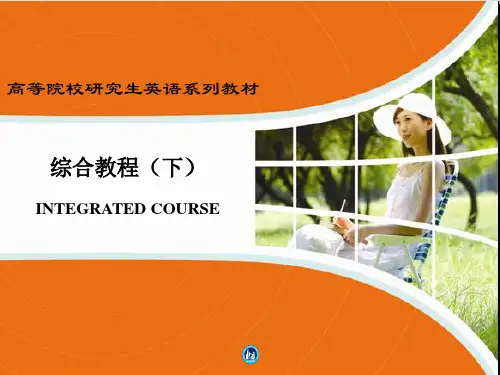
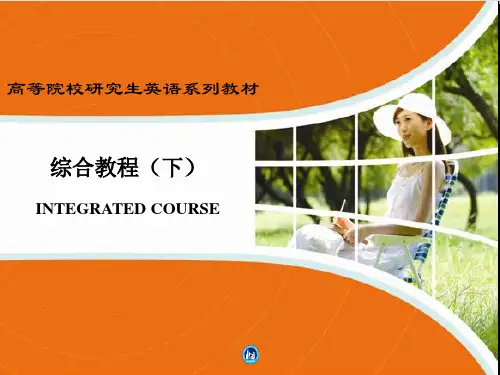


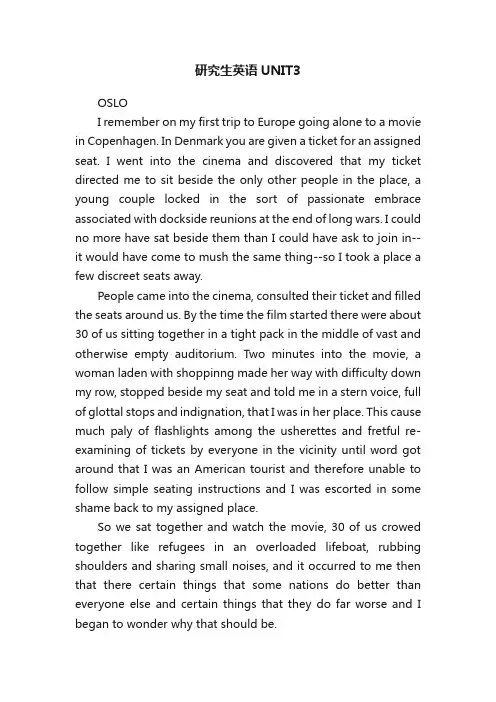
研究生英语UNIT3OSLOI remember on my first trip to Europe going alone to a movie in Copenhagen. In Denmark you are given a ticket for an assigned seat. I went into the cinema and discovered that my ticket directed me to sit beside the only other people in the place, a young couple locked in the sort of passionate embrace associated with dockside reunions at the end of long wars. I could no more have sat beside them than I could have ask to join in--it would have come to mush the same thing--so I took a place a few discreet seats away.People came into the cinema, consulted their ticket and filled the seats around us. By the time the film started there were about 30 of us sitting together in a tight pack in the middle of vast and otherwise empty auditorium. Two minutes into the movie, a woman laden with shoppinng made her way with difficulty down my row, stopped beside my seat and told me in a stern voice, full of glottal stops and indignation, that I was in her place. This cause much paly of flashlights among the usherettes and fretful re-examining of tickets by everyone in the vicinity until word got around that I was an American tourist and therefore unable to follow simple seating instructions and I was escorted in some shame back to my assigned place.So we sat together and watch the movie, 30 of us crowed together like refugees in an overloaded lifeboat, rubbing shoulders and sharing small noises, and it occurred to me then that there certain things that some nations do better than everyone else and certain things that they do far worse and I began to wonder why that should be.Sometimes a nation's little contrivances are so singular and clever that we associate them with that country alone-double-decker buses in Britain, windmills in Holland (what an insprired addition to a flat landscape: think how they would transform Nebraska), sidewalk cafes in Paris. And yet there are some things that most countries do without difficluty that others cannot get a grasp of at all. The French, for instance, cannot get the hang of queuing. They try and try, but it is beyond them. Wherever you go in Paris, you see orderly lines waiting at bus stops, but as soon as the bus pulls up the line instantly disintegretes into something like a fire drill at a lunatic asylum as everyone scrambles to be the fist aboard, quit unaware that this defeats the whole purpose of queuing.The British, on the other hand, do not understand certain of the fundamentals of eating, as evidenced by their instinct to consume hamburgers with a kinfe and fork.To my continuing amazement, many of them also turn their fork upside-down and balance the food on the back of it. I've lived in England for a decade and a half and I still have to quell an impulse to go up to strangers in pubs and restaurants and say, "Excuse me, can I give you a tip that'll help those peas bouncing all over the table?"Germans are flummoxed by humor, the Swiss have no concept of fun, the Spanish think there is nothing at all ridiculous about eating dinner at midnight, and the Italians should never, ever have been let in on the invention of the motor car.One of the small marvels of my first trip to Europe was the discovery that the world could be so full of variety, that there were so many different of doing essentially identical things, like eating and drinking and buying cinema tickets. It fascinated me that Europeans could at once be so alike-that they could be souniversally bookish and cerebral, and drive small cars, and live in little houses in ancient towns, and love soccer, and be relatively unmaterialistic and law-abiding, and have chilly hotel rooms and cosy and inviting places to eat and drink-and yet be so endlessly, unpredictably different from each other as well. I love the idea that you could never be sure of anything in Europe.I still enjoy that sense of never knowing quite what’s going on. In my hotel in Oslo, where I spent four days after returning from Hammerfest, the chambermaid each morning left me a packet of something called bio tex bla, a “minipakke for rerie,hyber og weekend”, according to the instruction, I spent many happy hours sniffing it and experimenting with it, uncertain whether it was for washing out clothes or gargling or cleaning the toilet bowl. In the end I decided it was for washing out clothes—it worked a treat—but for all I know for the rest of the week everywhere I went in oslo people were saying to each other, ”you know, that man smelled like toilet-bowl cleaner.”When I told my friends in london that I was going to travel around Europe and write a book about it, they said, ”oh ,you must speak a lot of languages.”“why, no,”I would reply with certain pride, ”only English ”and they would look at me as if I were crazy. But that’s the glory of foreign travel, as far as I am concerned. I don’t want to know what people are talking about, I can’t think of anything that excites a greater sense of childlikewonder than to be in country where you are ignorant of almost everything. Suddenly you are five years old again. Y ou can’t read anything, you have only the most rudimentary sense of how things work, you can’t even reliably cross a street without endangering your life. Y our whole existence becomes aseries or interesting guesses.I get great pleasure from watching foreign TV and trying to imagine what on earth is going on. On my first evening in Oslo I watched a science program in which two men in a studio stood at a lab table discussing a variety of sleek, rodent-like animals that were crawling over the surface and occasionally up the host’s jacket, “and you have sex with all these creatures, do you?”the host was saying.“certainly,”replied the guest,”you have to be careful with the porcupines, of course, and the lemmings get very neurotic and hurl themselves off cliffs if they feel you don’t love them as you once did, basically these animals make very affectionate companions, and the sex is simply out of this world.”“well, I think that’s wonderful. Next week we’ll be looking at how you can make hallucinogenic drugs with simple household chemicals from your own medicine cabinet, but now it’s time for the screen to go black for a minute and then for the lights to come up suddenly on the host of the day looking as if he was just about to pick his nose. See you next week. ”After Hammerfest, Oslo was simply wonderful. It was still cold and dusted with grayish snow, but it seemed positively tropical after Hammerfest, and I abandoned all thought of buying a furry hat.I went to the museums and for a day-long way out around the Bygdoy peninsula, where the city’s finest houses stand on the wooded hillsides, with fetching views across the icy water of the harbour to the downtown. But mostly I hung around the city center, wandering back and forth between the railway station and the royal palace, peering in the store windows along Karl Johans Gate, the long and handsome main pedestrian street, cheered bythe bright lights, mingling with the happy, healthy, relentlessly, youthful Norwegians, very pleased to be alive and out of Hammerfest and in a world of daylight. when I grew cold. I sat in cafés and bars and eavesdropped on conversations that I could not understand or brought out my Thomas Cook European Timetable and studies it with a kind of humble reverence, planning the rest of my trip. Thomas Cook European Timetable is possibly the finest book ever produced. It is impossible to leaf through its 500 pages of densely printed timetables without wanting to dump a double armload of clothes into an old Gla dstone and just take off. Every page whispers romance :”M-Z-S-I””B-T-V-V-M””G-L-H-S-V-M-L-P. who could recite these names without experiencing a tug of excitement, without seeing in his mind’s eye a steamy platform full of expectant travelers and piles of luggage standing besides a sleek, quater-mile-long train with a list of exotic locations slotted into every carriage? Who could read the names ”M-W-B-B-G” and not want to climb abroad? Well, Sunny von Biilow for a start. But as for me, I could spend hours just poring over the tables, each one a magical thicket of times, numbers, distances, mysterious little pictograms showing crossed knives and forks, wine glasses, daggers, miner’s pickaxes(whatever could they be for?), ferry boats and buses, and bewilderingly abstruse footnotes.。
外研版九年级下册英语Module7Unit3课文翻译英语翻译它一般包括英译汉与汉译英两种技能,关于外研版九年级下册英语Module7 Unit3的课文翻译有哪些呢?接下来是店铺为大家带来的关于外研版九年级下册英语Module7 Unit3课文翻译,希望会给大家带来帮助。
外研版九年级下册英语Module7 Unit3课文翻译(一)Language practice语言练习lt's also the subject that l'm best at,although my spoken English is not that good.它也是我最擅长的科目,尽管我的英语口语不是那么好。
I can speak English with you whenever we meet.无论何时我们见面,我都能和你说英语。
As China continues to grow, many people thinkthat Chinese will become as common as English by the middle of the twenty-first century.随着中国的不断壮大,很多人认为,到21世纪中期,汉语将会变得和英语一样普遍。
I hope I can continue to make progress next year.我希望明年能继续取得进步。
The British, the Indians and the Chinese all help(to) make it a rich language.英国人、印度人和中国人共同将英语变成了一门丰富的语言。
Complete the sentences with the words or expressions in the box. There may be more than one answer.用方框中的单词或短语完成句子。
Final Version of TranslationUnit two1.为什么我们与来自其它文化的人们的交流总是充满了误会、让人感到沮丧呢?令很多人奇怪的是,即使怀着良好的愿望、使用自己认为是友好的方式,甚至有互利的可能性,也似乎都不足以保证交流的成功。
有时候,出现排斥现象正是因为一方所属的文化群体团体是“不同”的。
在这个国际舞台发生重大变化的时刻,探讨为什么尝试交流的结果却令人失望的原因是必要的,这些原因实际上是跨文化交流中的绊脚石。
2.相似性的假设为什么误解或反对会产生呢?这个问题的一个回答就是,大部分的人天真地认为世界上的人有足够的相似之处,可以让我们成功地交流信息或感受,解决共同关注的一些问题,加强商业关系,或者只是产生我们所希望产生的印象。
所有的人都会生儿育女,组成家庭或社会,发展一种语言以及适应他们周围环境的这种倾向特别具有欺骗性,因为它带来了一种期望,这种期望就是这些行为的形式以及围绕这些行动的态度与价值观念将是相似的。
相信“人就是人”和“我们内在本质是相似的,”这让人感到心安理得,但是下定决心去寻找证据却只会令人失望。
3.力求证明达尔文关于面部表情是共同的这一理论的跨文化研究给人极大的希望,研究者发现脸部的某些看得见的形状,即因愤怒、恐惧、惊讶、悲伤、厌恶、幸福而紧缩的肌肉组合,我们人类各成员都是一样的。
但是这似乎无济于事,只要我们意识到一个人生长的文化决定了这种情感是否会表露或压抑,决定了在何种场合和多大的程度上会表露或压抑。
带来这种情绪感受的情形也因文化而异,例如:由于崇拜的文化信仰不同,一个心爱的人死亡可能带来欢乐、悲哀或其他情感。
4.因为似乎没有普遍的人性可以作为自动理解的基础,所以我们必须把每交往当作个别案例来处理,寻求任何共同的认知和交流方法并以此作为出发点。
如果我们认识到我们受文化的约束,受文化的改变,那么我们就会受这一现实:因为各自不同,我们确实不太清楚其他人“是”什么样的。
出现许多小仪式,并经常与一些个人承诺。
他们可能是孩子们的朋友的父母,邻居家里的客人,一个委员会的成员,从其他城市甚至另一个国家的商业伙伴。
作为进入美国的家里做客的到来,欧洲游客没有发现明显的地标。
气氛是轻松的。
大多数人,老的少的,被称为首先名字。
Who, then, is friend?Even simple translation from one language to another is difficult. " You see." a Frenchman explai ns, "if I were to say to you in France, 'This is my good friend, 'that person would not be as close to me as someone about whom I said only, 'This is my friend. 'Anyone about whom I have to say more is really less. " 使是简单的从一种语言翻译成另一种是困难的,“你看,”法国人解释说,“如果我说你在法国,这是我的好朋友,'这个人不会像我这样的人靠近约人我说的只是,这是我的朋友。
' 关于他我要多说任何人是真的少了。
In France, as in many other European countries, friends generally are of the same sex, and friend ship is seen as basically a relationship between men. Frenchwomen laugh at the idea that "wome n can' t be friends, "but they also admit sometimes that for women "it's a different thing. "And m any French people doubt the possibility of a friendship between a man and a woman. There is als o the kind of relationship within a group -men and women who have worked together for a long time, who may be very close, sharing gre at loyalty and warmth of feeling. They may call one another copains -a word that in English becomes "friends" but has more the feeling of "pals "or "buddies. "In Fren ch eyes this is not friendship, although two members of such a group may well be friends. 在法国,在许多欧洲国家,朋友一般都是同性,友谊是人与人之间的关系基本上是看到。
外研社版八年级下册英语课文原文与翻译M3-M4英汉对照Module 3Unit 1 Has it arrived yet3 Listen and read.Daming: Hi, Tony. What are you up to?大明:嗨,托尼。
在忙什么呢?Tony: Hi, Daming. I’ve just made a model spaceship for our school project.托尼:嗨,大明。
我刚刚做完了我们学校项目要求的宇宙飞船模型Daming: I haven’t started yet because I’m not sure how to make it Can you help me?大明:我还没开始呢,真不知道该怎么做,你能帮我吗?Tony: Sure, no problem. Have you heard the latest news Scientists have sent a spaceship to Mars. The journey has taken several months.托尼:当然可以,没问题。
你听说最新的消息了吗?科学家已向火星发射了一个航天器,它在太空中已经行驶了好几个月了。
Daming: Has it arrived yet?大明:他到达火星了吗?Tony: Yes, it has arrived already. That’s why it’s on the news.托尼:已经到了,所以新闻才报导嘛。
Daming: So have they discovered life on Mars大明:那他们在火星上发现生命了吗?Tony: No, they haven’t yet.托尼:还没有。
Daming: Are there any astronauts in the spaceship大明:航天器上有宇航员吗?Tony: No, there aren’t.托尼:没有。
Unit One[1] 你看酒杯是半杯有酒而不是半杯空着的吗?你的眼睛是盯着炸面圈,而不是它中间的孔吗? 当研究者们仔细观察积极思维的作用时,这些陈词滥调突然间都成了科学问题。
Do you see the glass as half-full rather than half empty? Do you keep your eye upon the doughnut ,not upon the hole? Suddenly these cliches are scientific questions ,as researchers scrutinize the power of positive thinking.[2] 迅速增多的大量研究工作——迄今已有104 个研究项目,涉及大约15 000人——证明乐观的态度可以使你更快乐、更健康、更成功。
与此相反,悲观则导致无望、疾病以及失败,它与沮丧、孤独、令人苦恼的腼腆密切相关。
休斯敦莱斯大学的心理学家克雷格·A·安德森说:“如果我们能够教会人们更积极地思考,那就如同为他们注射了预防这些心理疾病的疫苗。
”[3] “你的能力固然重要,”匹兹堡卡内基–梅隆大学的心理学家迈克尔·F·沙伊尔说,“但你成功的信念影响到你是否真能成功。
”在某种程度上,这是由于乐观者和悲观者以截然不同的方式对待同样的挑战和失望。
[4] 以你的工作为例。
宾夕法尼亚大学的心理学家马丁·E·P·塞利格曼与同事彼得·舒尔曼在一项重要研究中对大都会人寿保险公司的推销员进行了调查。
他们发现,在工龄较长的推销员中,积极思考者比消极思考者要多推销37% 的保险额。
在新雇用的推销员中,乐观主义者则多销了20%。
[5] 公司受到了触动,便雇用了100 名虽未通过标准化行业测试但在态度乐观一项得分很高的人。
这些本来可能根本不会被雇用的人售出的保险额高出一般的推销员10%。
研究生英语系列教材下unit3-原文+翻译Unit3 Oslp1.I remember on my first trip to Europe going alone to a movie in Copenhagen. In Denmark you are given a ticket for an assigned seat.I went into the cinema and discovered that my ticket directed me to sit beside the only other people in the place,a young couple locked in the sort of passionate embrace associated with dockside reunions at the end of long wars. I could no more have sat beside them than I could have asked to join in-it would have come to much the same thing- so I took a place a few discreet seats away. 1记得我第一次去欧洲旅行的时候,我在哥本哈根独自一人去看电影。
在丹麦,电影票是对号入座的。
(此文来自袁勇兵博客)我走进电影院,发现在我的票对应的座位旁,只有一对年轻情侣。
这对情侣如胶似漆地拥抱在一起,如同一场持久战争结束后码头上亲人的团聚。
我很不情愿坐在他们旁边,就如我绝不会要求加入他们的行为一样——这两者对我来说并没有什么不同——因此我谨慎地隔几个座位坐了下来。
2. People came into the cinema, consulted their tickets and filled the seats around us. By the time the film started there were about 30 of us sitting together in a tight pack in the middle of a vast and otherwise empty auditorium. Two minutes into the movie, a woman laden with shopping made her way with difficulty down my row, stopped beside my seat and told me in a stern voice, full of glottal stops and indignation, that I was in her place. This caused much play of flashlights among the usherettes and fretful re-examining of tickets by everyone in the vicinity until word got around that I was an American tourist and therefore unable to follow simple seating instructions and. I was escorted in some shame back to my assigned place.2人们陆续地走进影院,参照电影票找到位子,在我们周围坐了下来。
电影开场时,这个宽敞空旷的观众席中间,扎堆地坐了约30人。
电影开场两分钟后,一个拎着大包小包购物袋的女士艰难地挤到我这排,在我座位旁停下,并用严厉的口吻愤怒地朝我用充满了喉塞音的丹麦语说道,我坐在了她的位子上。
女引座员马上打开手电筒查看情况,身边所有的人都不安地重新确认自己票上的座位号,直到大家都清楚了,我是一个美国游客,因此没有遵循简单的就座指示。
在羞愧中我被送回指定的位子。
3.So we sat together and watched the movie, 30 of us crowded together like refugees in an overloaded lifeboat, rubbing shoulders and sharing small noises, and it occurred to me then that there are certain things that some nations do better than everyone else and certain things that they do far worse and I began to wonder why that should be.3接下来我们坐在一起看电影,30人如同一艘超载的救生船上的难民一般挤作一团。
肩膀相互摩擦着,忍受着各种细小的噪声。
那时我想,有些国家在某些事情上做的比任何其他国家都好,然而在另外一些事情上,他们却糟糕很多。
我开始思考为何会有如此反差。
4.Sometimes a nation's little contrivances are sosingular and clever that we associate them with that country alone-double-decker buses in Britain, windmills in Holland (what an inspired addition- to a flat landscape: think how they would transform Nebraska),sidewalk cafes in Paris. And yet there are some things that most countries do without difficulty that others cannot get a grasp of at all.4有时候某个国家的小发明是如此独特和精巧,以至于我们总是由它而联想到这个国家——英国的双层巴士,荷兰的风车(给原本单调的景观增添了多么美妙的创意:想想这些风车是如何改变了内布拉斯加州),还有巴黎人行道上的露天咖啡馆。
然而,也有一些事情,大部分国家能不费吹灰之力地办到,但某些国家却完全想不到。
5.The French, for instance, cannot get the hang of queuing. They try and try, but it is beyond them. Wherever you go in Paris,you see orderly lines waiting at bus stops, but as soon as the bus pulls up the lineinstantly disintegrates into something like a fire drill at a lunatic asylum as everyone scrambles to be the first aboard, quite unaware that this defeats the whole purpose of queuing.5比如说,法国人无法掌握排队的窍门。
他们一遍遍地尝试,但这似乎超出了他们的能力范围。
无论你去巴黎的任何地方,总会看到整齐的队伍在公交车站候车。
但一旦公交车靠站,队伍立刻瓦解,就像精神病院的消防演习一样,所有人都争抢着第一个上车,完全没意识到,这样一来排队的意义就荡然无存了。
6.The British, on the other hand, do not understand certain of the fundamentals of eating, as evidenced by their instinct to consume hamburgers with a knife and fork. To my continuing amazement, many of them also turn their fork upside一down and balance the food on the back of it. I’ve lived in England for a decade and a half and 1 still have to quell an impulse to go up to strangers in pubs and restaurants and say,"Excuse me. Can I give you a tip that'll help stop those peas bouncing all over the table?"6另一方面,英国人则不能领略吃的基本要领。
证据就是他们本能地使用刀叉来食用汉堡。
更令我惊讶的是,他们大多数都把叉子颠倒放置,将食物搁在它的背上。
我已经在英国居住了 15年,但我仍不得不压制这种冲动,想要走向酒吧或餐馆里的陌生人说:“打扰一下,可以允许我告诉你一个小技巧吗?(此文来自袁勇兵博客)那样你就不会把豆子散落在整张桌子上了。
7.Germans are flummoxed by humor, the Swiss have no concept of fun, the Spanish think there is nothing at all ridiculous about eating dinner at midnight, and the Italians should never, ever have been let in on the invention of the motor car.7德国人被幽默困扰,瑞士人对乐趣毫无概念,西班牙人丝毫不觉得在半夜吃晚饭有什么滑稽之处,而意大利人从不,也绝不会让别人告诉他们汽车是如何发明的。
8.One of the small marvels of my first tripto Europe was the discovery that the world could be so full of variety, that there were so many different ways of doing essentially identical things, like eating and drinking and buying cinema tickets. It fascinated me that Europeans could at once be so alike-that they could be so universally bookish and cerebral, and drive small cars, and live in little houses in ancient towns, and love soccer, and be relatively unmaterialistic and law-abiding, and have chilly hotel rooms and cosy and inviting places to eat and drink-and yet be so endlessly, unpredictably different from each other as well. I loved the idea that you could never be sure of anything in Europe. 8这次欧洲之旅带给我很多惊奇的小事,其中一个就是我发现世界竟能如此多样化,对于本质上相同的事物处理起来却方式各异,比如说吃喝或是买电影票。